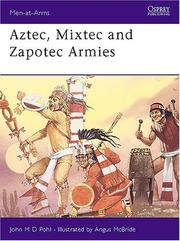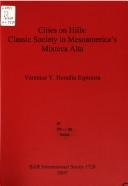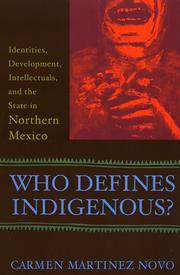| Listing 1 - 10 of 51 | << page >> |
Sort by
|
Book
Year: 1950 Volume: 2 Publisher: México : Institute Nacional Iniigenista,
Abstract | Keywords | Export | Availability | Bookmark
 Loading...
Loading...Choose an application
- Reference Manager
- EndNote
- RefWorks (Direct export to RefWorks)

ISBN: 9781855321595 1855321599 Year: 1991 Publisher: Oxford: Osprey,
Abstract | Keywords | Export | Availability | Bookmark
 Loading...
Loading...Choose an application
- Reference Manager
- EndNote
- RefWorks (Direct export to RefWorks)
Around AD 1450 a new Mexican nation emerged called the Aztec Empire of the Triple Alliance. They succeeded in making themselves the most powerful and feared civilisation in the Americas. The Mixtec and Zapotec peoples were contemporaries of the Aztec nations, and both formed alliances and fought many wars against them. With Angus McBride's usual quality artwork on eight full page colour plates, plus plenty of other illustrations from various sources, this work by John Pohl investigates the history, uniforms and weaponry of Aztec, Mixtec and Zapotec armies. ... Publisher description
Aztecs --- Mixtec Indians --- Zapotec Indians --- Armies
Book
Abstract | Keywords | Export | Availability | Bookmark
 Loading...
Loading...Choose an application
- Reference Manager
- EndNote
- RefWorks (Direct export to RefWorks)
Indians of Mexico --- Indians of Mexico. --- Mixtec Indians --- Mixtec Indians --- Mixtec Indians --- Mixtec Indians. --- Zapotec Indians --- Zapotec Indians --- Zapotec Indians --- Zapotec Indians. --- Antiquities. --- Antiquities. --- Antiquities. --- Antiquities.

ISBN: 9781407301723 Year: 2007 Publisher: Oxford : Archaeopress,
Abstract | Keywords | Export | Availability | Bookmark
 Loading...
Loading...Choose an application
- Reference Manager
- EndNote
- RefWorks (Direct export to RefWorks)
Excavations (Archaeology) --- Indians of Mexico --- Indians of Mexico --- Mixtec Indians --- Mixtec Indians --- Dwellings --- Antiquities. --- Antiquities. --- Dwellings.
Book
Year: 2016 Publisher: Boulder, Colorado : University Press of Colorado,
Abstract | Keywords | Export | Availability | Bookmark
 Loading...
Loading...Choose an application
- Reference Manager
- EndNote
- RefWorks (Direct export to RefWorks)
Mixtec Evangelicals is a comparative ethnography of four Mixtec communities in Oaxaca, detailing the process by which economic migration and religious conversion combine to change the social and cultural makeup of predominantly folk-Catholic communities. The book describes the effects on the home communities of the Mixtecs who travel to northern Mexico and the United States in search of wage labor and return having converted from their rural Catholic roots to Evangelical Protestant religions. O’Connor demonstrates the ways that neoliberal policies have forced Mixtecs to migrate and how migration provides the contexts for conversion. Converts challenge the set of customs governing their Mixtec villages by refusing to participate in the Catholic ceremonies and social gatherings that are at the center of traditional village life. Home communities have responded in a number of ways—ranging from expulsion of converts to partial acceptance and adjustments within the village.
Mixtec Indians --- Return migrants --- Return migration --- Religion. --- Migrations.
Book
ISBN: 0806118849 Year: 1984 Publisher: Norman University of Oklahoma press
Abstract | Keywords | Export | Availability | Bookmark
 Loading...
Loading...Choose an application
- Reference Manager
- EndNote
- RefWorks (Direct export to RefWorks)
Indians of Mexico --- Mixtec Indians --- History --- Social life and customs
Book
Year: 2016 Publisher: Boulder, Colorado : University Press of Colorado,
Abstract | Keywords | Export | Availability | Bookmark
 Loading...
Loading...Choose an application
- Reference Manager
- EndNote
- RefWorks (Direct export to RefWorks)
Mixtec Evangelicals is a comparative ethnography of four Mixtec communities in Oaxaca, detailing the process by which economic migration and religious conversion combine to change the social and cultural makeup of predominantly folk-Catholic communities. The book describes the effects on the home communities of the Mixtecs who travel to northern Mexico and the United States in search of wage labor and return having converted from their rural Catholic roots to Evangelical Protestant religions. O’Connor demonstrates the ways that neoliberal policies have forced Mixtecs to migrate and how migration provides the contexts for conversion. Converts challenge the set of customs governing their Mixtec villages by refusing to participate in the Catholic ceremonies and social gatherings that are at the center of traditional village life. Home communities have responded in a number of ways—ranging from expulsion of converts to partial acceptance and adjustments within the village.
Mixtec Indians --- Return migrants --- Return migration --- Religion. --- Migrations.
Book
Year: 2016 Publisher: Boulder, Colorado : University Press of Colorado,
Abstract | Keywords | Export | Availability | Bookmark
 Loading...
Loading...Choose an application
- Reference Manager
- EndNote
- RefWorks (Direct export to RefWorks)
Mixtec Evangelicals is a comparative ethnography of four Mixtec communities in Oaxaca, detailing the process by which economic migration and religious conversion combine to change the social and cultural makeup of predominantly folk-Catholic communities. The book describes the effects on the home communities of the Mixtecs who travel to northern Mexico and the United States in search of wage labor and return having converted from their rural Catholic roots to Evangelical Protestant religions. O’Connor demonstrates the ways that neoliberal policies have forced Mixtecs to migrate and how migration provides the contexts for conversion. Converts challenge the set of customs governing their Mixtec villages by refusing to participate in the Catholic ceremonies and social gatherings that are at the center of traditional village life. Home communities have responded in a number of ways—ranging from expulsion of converts to partial acceptance and adjustments within the village.
Mixtec Indians --- Return migrants --- Return migration --- Religion. --- Migrations.

ISBN: 9780813536682 9780813536699 Year: 2006 Publisher: New Brunswick Rutgers University Press
Abstract | Keywords | Export | Availability | Bookmark
 Loading...
Loading...Choose an application
- Reference Manager
- EndNote
- RefWorks (Direct export to RefWorks)
Culture and globalization --- Indian business enterprises --- Mixtec Indians --- Mixtec Indians --- Mixtec Indians --- Economic conditions --- Ethnic identity --- Social conditions --- Tijuana (Baja California, Mexico) --- Tijuana (Baja California, Mexico) --- Tijuana (Baja California, Mexico) --- Economic conditions. --- Ethnic relations. --- Social conditions.
Book
Year: 1963 Volume: 3. Publisher: México] : Instituto Nacional Indigenista,
Abstract | Keywords | Export | Availability | Bookmark
 Loading...
Loading...Choose an application
- Reference Manager
- EndNote
- RefWorks (Direct export to RefWorks)
Mixtec Indians --- Mixtec Indians --- Indians of Mexico --- Indiens mixtèques --- Costume. --- Social life and customs --- Clothing. --- Moeurs et coutumes --- Jamiltepec, Mexico (District)
| Listing 1 - 10 of 51 | << page >> |
Sort by
|

 Search
Search Feedback
Feedback About UniCat
About UniCat  Help
Help News
News